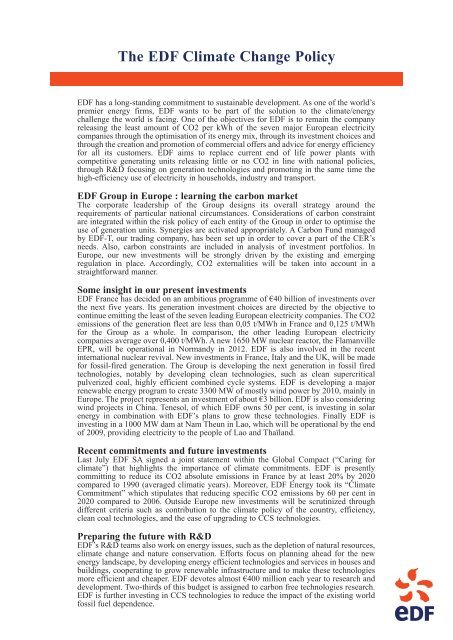Climate Action 2007-2008
You also want an ePaper? Increase the reach of your titles
YUMPU automatically turns print PDFs into web optimized ePapers that Google loves.
The EDF <strong>Climate</strong> Change Policy<br />
EDF has a long-standing commitment to sustainable development. As one of the world’s<br />
premier energy firms, EDF wants to be part of the solution to the climate/energy<br />
challenge the world is facing. One of the objectives for EDF is to remain the company<br />
releasing the least amount of CO2 per kWh of the seven major European electricity<br />
companies through the optimisation of its energy mix, through its investment choices and<br />
through the creation and promotion of commercial offers and advice for energy efficiency<br />
for all its customers. EDF aims to replace current end of life power plants with<br />
competitive generating units releasing little or no CO2 in line with national policies,<br />
through R&D focusing on generation technologies and promoting in the same time the<br />
high-efficiency use of electricity in households, industry and transport.<br />
EDF Group in Europe : learning the carbon market<br />
The corporate leadership of the Group designs its overall strategy around the<br />
requirements of particular national circumstances. Considerations of carbon constraint<br />
are integrated within the risk policy of each entity of the Group in order to optimise the<br />
use of generation units. Synergies are activated appropriately. A Carbon Fund managed<br />
by EDF-T, our trading company, has been set up in order to cover a part of the CER’s<br />
needs. Also, carbon constraints are included in analysis of investment portfolios. In<br />
Europe, our new investments will be strongly driven by the existing and emerging<br />
regulation in place. Accordingly, CO2 externalities will be taken into account in a<br />
straightforward manner.<br />
Some insight in our present investments<br />
EDF France has decided on an ambitious programme of €40 billion of investments over<br />
the next five years. Its generation investment choices are directed by the objective to<br />
continue emitting the least of the seven leading European electricity companies. The CO2<br />
emissions of the generation fleet are less than 0,05 t/MWh in France and 0,125 t/MWh<br />
for the Group as a whole. In comparison, the other leading European electricity<br />
companies average over 0,400 t/MWh. A new 1650 MW nuclear reactor, the Flamanville<br />
EPR, will be operational in Normandy in 2012. EDF is also involved in the recent<br />
international nuclear revival. New investments in France, Italy and the UK, will be made<br />
for fossil-fired generation. The Group is developing the next generation in fossil fired<br />
technologies, notably by developing clean technologies, such as clean supercritical<br />
pulverized coal, highly efficient combined cycle systems. EDF is developing a major<br />
renewable energy program to create 3300 MW of mostly wind power by 2010, mainly in<br />
Europe. The project represents an investment of about €3 billion. EDF is also considering<br />
wind projects in China. Tenesol, of which EDF owns 50 per cent, is investing in solar<br />
energy in combination with EDF’s plans to grow these technologies. Finally EDF is<br />
investing in a 1000 MW dam at Nam Theun in Lao, which will be operational by the end<br />
of 2009, providing electricity to the people of Lao and Thaïland.<br />
Recent commitments and future investments<br />
Last July EDF SA signed a joint statement within the Global Compact (“Caring for<br />
climate”) that highlights the importance of climate commitments. EDF is presently<br />
committing to reduce its CO2 absolute emissions in France by at least 20% by 2020<br />
compared to 1990 (averaged climatic years). Moreover, EDF Energy took its “<strong>Climate</strong><br />
Commitment” which stipulates that reducing specific CO2 emissions by 60 per cent in<br />
2020 compared to 2006. Outside Europe new investments will be scrutinized through<br />
different criteria such as contribution to the climate policy of the country, efficiency,<br />
clean coal technologies, and the ease of upgrading to CCS technologies.<br />
Preparing the future with R&D<br />
EDF’s R&D teams also work on energy issues, such as the depletion of natural resources,<br />
climate change and nature conservation. Efforts focus on planning ahead for the new<br />
energy landscape, by developing energy efficient technologies and services in houses and<br />
buildings, cooperating to grow renewable infrastructure and to make these technologies<br />
more efficient and cheaper. EDF devotes almost €400 million each year to research and<br />
development. Two-thirds of this budget is assigned to carbon free technologies research.<br />
EDF is further investing in CCS technologies to reduce the impact of the existing world<br />
fossil fuel dependence.












